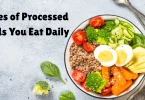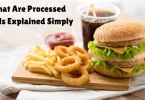In today’s fast-paced world, processed meals have become a convenient choice for many people. From frozen dinners and instant noodles to packaged snacks and ready-to-eat sandwiches, these foods are designed to save time. However, they often come with high levels of sugar, salt, unhealthy fats, and preservatives, which can negatively impact long-term health. Over time, frequent consumption of processed meals has been linked to weight gain, diabetes, heart disease, high blood pressure, and other chronic illnesses.
Choosing the best healthy alternatives to processed meals can transform your eating habits, improve your nutrition, help manage your weight, and reduce your risk of lifestyle-related diseases. Let’s explore these alternatives in detail.
1. Fresh Fruits and Vegetables

Fresh fruits and vegetables are among the most essential best healthy alternatives to processed meals. They are naturally low in calories but packed with vitamins, minerals, fiber, and antioxidants. Eating a variety of produce supports immune function, improves digestion, and lowers the risk of chronic diseases.
Tips to include more produce in your daily diet:
- Breakfast: Add berries, apple slices, or bananas to your cereal, oatmeal, or yogurt.
- Lunch: Create colorful salads with spinach, kale, tomatoes, cucumbers, bell peppers, and carrots. Include a variety of textures and colors for maximum nutrients.
- Snacks: Snack on carrot sticks, cucumber slices, cherry tomatoes, or bell pepper strips with hummus or yogurt dip instead of reaching for chips or candy.
Pro Tip: Frozen vegetables and fruits are also excellent alternatives to processed foods since they are flash-frozen at peak freshness and retain most of their nutrients.
2. Whole Grains
Processed meals often rely on refined grains such as white rice, white bread, and pasta, which are stripped of fiber, vitamins, and minerals. Swapping these with whole grains is one of the top best healthy alternatives to processed meals, promoting better digestion and sustained energy.
Healthy whole grain options:
- Brown rice, quinoa, bulgur, barley, and farro
- Whole-grain pasta, tortillas, and breads
- Oats for breakfast or snacks
Tips:
- Swap white rice for quinoa or brown rice in stir-fries and casseroles.
- Choose whole-grain wraps for sandwiches instead of white flour tortillas.
- Prepare overnight oats with fruits and nuts for a quick, nutrient-rich breakfast.
Pro Tip: Whole grains are high in fiber, which helps you feel full longer and prevents overeating.
3. Lean Proteins
Processed meals often include processed meats like hot dogs, sausages, or deli meats, which are high in sodium and preservatives. Replacing them with lean, natural proteins is essential for building muscle, repairing tissues, and maintaining a healthy metabolism.
Healthy protein sources:
- Skinless chicken and turkey
- Fresh fish such as salmon, mackerel, or tuna (rich in omega-3 fatty acids)
- Plant-based proteins like lentils, chickpeas, black beans, tofu, and tempeh
Tips:
- Grill, bake, or steam proteins instead of frying to preserve nutrients.
- Add legumes like chickpeas or lentils to salads and soups for a protein boost.
- Rotate between animal and plant proteins to diversify your nutrient intake.
Pro Tip: Including a protein source in every meal helps stabilize blood sugar levels and reduces cravings for processed snacks.
You may also like to read this:
What Are Processed Meals Explained Simply – Quick Guide
How Are Frozen Meals Made In Factories: Complete Guide
16 Common Types of Processed Foods You Eat Daily
Why People Prefer Ready-To-Eat Meals For Busy Lifestyles
4. Homemade Soups and Stews
Canned soups and ready-made broths are convenient but often contain excessive sodium, sugar, and artificial flavors. Preparing homemade soups and stews is one of the best healthy alternatives to processed meals because it allows you to control the ingredients while enjoying a nutrient-dense, filling meal.
Ideas for healthy homemade soups:
- Lentil or chickpea soup with onions, garlic, carrots, and spinach
- Chicken or fish soup with fresh herbs, garlic, and root vegetables
- Vegetable minestrone with beans, kale, and whole-grain pasta
Tips:
- Make large batches and freeze portions for later use.
- Use homemade broth instead of store-bought varieties.
- Spice up your soups with herbs like thyme, rosemary, and bay leaves for flavor without extra sodium.
Pro Tip: Soups and stews are ideal for meal prep, ensuring you always have a healthy, ready-to-eat alternative to processed foods.
5. Healthy Snacks
Processed snacks like chips, cookies, packaged granola bars, and candy are high in added sugar, trans fats, and artificial flavors. Opting for healthy snacks is one of the best healthy alternatives to processed meals, helping to curb hunger between meals while providing essential nutrients.
Healthy snack ideas:
- Raw nuts and seeds such as almonds, walnuts, chia seeds, and pumpkin seeds
- Fresh fruit smoothies or energy balls made with oats, dates, and nut butter
- Greek yogurt with fresh berries, a drizzle of honey, or a sprinkle of flax seeds
Tips:
- Prepare snack packs with chopped vegetables and hummus to grab on the go.
- Replace sugary desserts with fruit-based options.
- Keep portion sizes in check to avoid overconsumption of even healthy snacks.
6. Homemade Frozen Meals

Instead of relying on store-bought frozen meals, which are often processed and high in sodium, making your own frozen meals is a practical way to enjoy the best healthy alternatives to processed meals.
Ideas for homemade frozen meals:
- Grilled chicken or fish with roasted vegetables, frozen in individual portions
- Pre-cooked quinoa or brown rice with beans and assorted vegetables
- Vegetable-packed omelets or frittatas, frozen for quick breakfasts or lunches
Tips:
- Label meals with the date of preparation to ensure freshness.
- Use freezer-safe containers or bags to maintain quality.
- Reheat gently to preserve taste and nutrients.
7. Healthy Condiments and Sauces
Processed meals are often flavored with sauces loaded with sugar, salt, and preservatives. Replacing these with homemade condiments is one of the easiest best healthy alternatives to processed meals.
Healthy options:
- Fresh tomato salsa instead of ketchup or pre-made pasta sauces
- Guacamole made from ripe avocados
- Yogurt-based dressings flavored with herbs and lemon juice
Tips:
- Experiment with herbs, spices, garlic, and citrus for natural flavor.
- Avoid store-bought sauces that list sugar or high-fructose corn syrup among the top ingredients.
- Make small batches to maintain freshness.
8. Herbs and Spices
Processed meals rely heavily on artificial flavors and salt. Using fresh herbs and spices is a natural way to boost taste while keeping meals healthy. Including herbs and spices is also part of the best healthy alternatives to processed meals.
Popular choices:
- Fresh: basil, cilantro, parsley, dill, and mint
- Dried or powdered: turmeric, ginger, paprika, garlic powder, cinnamon, cumin
Tips:
- Experiment with combinations like rosemary and thyme for roasted dishes.
- Use spices to replace salt, sugar, or unhealthy flavor enhancers.
- Herbs and spices are packed with antioxidants and have anti-inflammatory benefits.
9. Meal Prepping for Busy Lifestyles
One of the main reasons people rely on processed meals is convenience. Preparing meals in advance is a practical strategy to stay consistent with the best healthy alternatives to processed meals. Meal prepping allows you to plan balanced meals for the week, reducing the temptation to grab unhealthy options.
Tips for effective meal prepping:
- Batch cooking: Cook grains, proteins, and vegetables in large quantities at the start of the week.
- Portion control: Use containers to separate meals into individual portions for easy grab-and-go access.
- Variety: Rotate proteins, grains, and vegetables to prevent boredom and ensure a wide range of nutrients.
- Freezer-friendly meals: Freeze soups, stews, casseroles, or omelets to have a ready-to-eat option anytime.
Pro Tip: Even simple preparations, like washing and chopping vegetables ahead of time, can save minutes and make healthy eating effortless.
10. Incorporating Healthy Fats
Many processed meals are loaded with trans fats or unhealthy oils, which can contribute to inflammation and heart disease. Including natural, healthy fats is another essential element in the list of best healthy alternatives to processed meals.
Healthy fat sources:
- Avocados
- Nuts and seeds (almonds, walnuts, chia seeds, flaxseeds)
- Olive oil, coconut oil, and avocado oil
- Fatty fish like salmon, mackerel, and sardines
Tips:
- Use olive oil or avocado oil for cooking instead of vegetable or canola oils.
- Sprinkle seeds over salads or yogurt for a healthy crunch.
- Include fatty fish in meals at least twice a week for omega-3 benefits.
Pro Tip: Healthy fats help absorb fat-soluble vitamins (A, D, E, and K) and keep you full longer.
11. Smart Beverage Choices
Processed meals are often paired with sugary drinks, sodas, or pre-packaged juices that contribute empty calories and spikes in blood sugar. Choosing healthier beverages is an important part of the best healthy alternatives to processed meals.
Healthy drink options:
- Water (plain, sparkling, or infused with fruits and herbs)
- Unsweetened herbal teas (green tea, chamomile, peppermint)
- Freshly squeezed juices or smoothies (without added sugar)
- Coconut water for natural electrolytes
Tips:
- Replace soda and sugary drinks with flavored water or herbal teas.
- Avoid store-bought juices with added sugars; make your own at home.
- Keep a reusable water bottle handy to stay hydrated throughout the day.
Pro Tip: Hydration supports metabolism, improves energy, and reduces unnecessary snacking.
12. Mindful Eating Practices
Healthy eating isn’t just about choosing the best healthy alternatives to processed meals—it’s also about how you eat. Mindful eating helps you recognize hunger cues, enjoy meals, and prevent overeating.
Tips for mindful eating:
- Eat slowly and savor each bite.
- Avoid distractions like phones or TV during meals.
- Pay attention to portion sizes and stop when full.
- Keep healthy foods visible and processed foods out of easy reach.
Pro Tip: Mindful eating can enhance digestion, improve satisfaction, and help maintain a healthy weight.
13. Gradual Transition
Switching entirely from processed meals to healthier alternatives may feel overwhelming. The key is gradual change. Start by replacing one processed meal or snack each day with a healthy option and slowly increase over time.
Step-by-step approach:
- Replace breakfast: Swap instant cereals or pastries with oatmeal, fruit, or yogurt parfaits.
- Replace lunch: Swap pre-packaged sandwiches with a fresh salad or grain bowl.
- Replace snacks: Substitute chips or cookies with nuts, fruits, or energy balls.
- Replace dinner: Swap frozen or pre-made dinners with homemade soups, grilled proteins, and vegetables.
Pro Tip: Small, consistent changes are more sustainable than drastic overhauls.
Conclusion
Adopting the best healthy alternatives to processed meals is a journey toward better health, higher energy, and improved overall well-being. By focusing on fresh fruits and vegetables, whole grains, lean proteins, homemade soups, healthy snacks, natural herbs and spices, and mindful eating practices, you can drastically reduce your reliance on processed foods.
Healthy eating doesn’t mean sacrificing taste or convenience. With simple strategies like meal prepping, smart beverage choices, and gradual transitions, nutritious meals can be quick, enjoyable, and satisfying. Every step you take toward replacing processed meals with wholesome alternatives is an investment in your long-term health, energy, and vitality.
FAQs
1. What are processed meals?
Processed meals are pre-packaged or ready-to-eat foods high in sugar, salt, unhealthy fats, and preservatives, which can harm long-term health.
2. What are easy healthy alternatives?
Fresh fruits and vegetables, whole grains, lean proteins, homemade soups, healthy snacks, and natural herbs and spices.
3. Are frozen vegetables healthy?
Yes, frozen vegetables retain most nutrients and are convenient, making them a great alternative to processed frozen meals.
4. How can I replace processed snacks?
Opt for nuts, seeds, fresh fruit, energy balls, or Greek yogurt instead of chips, cookies, or candy.
5. Are homemade frozen meals a good option?
Absolutely. They allow control over ingredients while remaining convenient, e.g., vegetable omelets, grilled proteins, or quinoa bowls.





